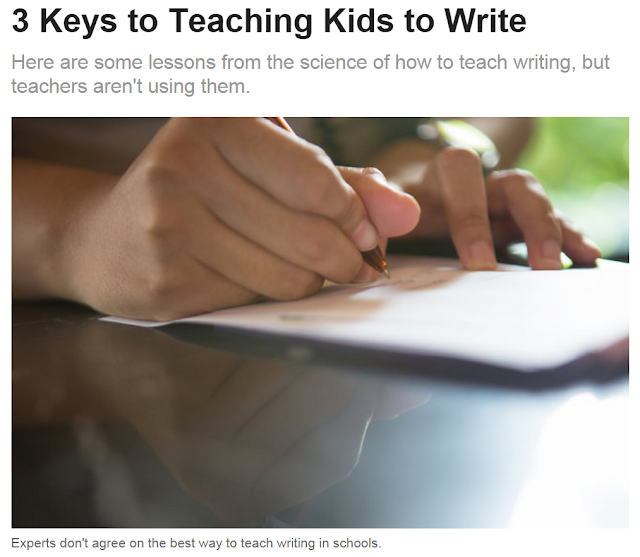DepEd K to 12: Expectations versus Reality
Back in 2012 at a General Education Conference held in the University of the Philippines, Dina S. Ocampo (currently the DepEd Undersecretary for Programs and Projects) stated the following,
An article published in the Hechinger Report starts with the following photo and caption:
In the article, Steve Graham of Arizona State University cites three proven ways of helping students learn to write, but are often not implemented in schools. These are based on a meta-analysis scheduled to be published in the Elementary School Journal. Here are the three:
It is quite straightforward to gauge a curriculum by considering the resources and the environment provided. It is easy to gauge if such inputs are indeed positive and supportive. In writing, it is therefore clear that the reality of DepEd K to 12 speaks differently from its expectations. No one should be surprised then with a guaranteed disappointment in the future.
"At the end of 12 grades, they are supposed to develop learners who are integrative, who are savvy with information, have media and technology skills, effective communication and life career skills, produce all forms of texts (e.g. written, oral, visual, digital) based on solid grounding on Philippine experience and culture; an understanding of the self, community and the nation; competency in formulating ideas/arguments logically, scientifically and creatively; and clear appreciation of one’s responsibility as a citizen of a multicultural Philippines and a diverse world, systematically apply knowledge, understanding, theory and skills for the development of the self, local and global communities using prior learning, inquiry and experimentation; work comfortably with relevant technologies and develop adaptations and innovations for significant use in local and global communities; communicate with local and global communities with proficiency, orally, in writing and through new technologies of communication; and interact meaningfully in a social setting and contribute to the fulfillment of individual and shared goals, respecting the fundamental humanity of all persons and the diversity of groups and communities."These are indeed lofty goals not simply because the above statement is wordy. Ocampo's statement is excessively protracted but in reality, just one simple short phrase could easily make basic education already challenging: teach students to write. In this area, it is easy to see that promoters of DepEd's K to 12 have often been excessively pompous when it comes to proclaiming assumed benefits of the curriculum, but frequently fall short in confronting reality.
An article published in the Hechinger Report starts with the following photo and caption:
In the article, Steve Graham of Arizona State University cites three proven ways of helping students learn to write, but are often not implemented in schools. These are based on a meta-analysis scheduled to be published in the Elementary School Journal. Here are the three:
1. Spend more time writing.DepEd's K to 12 is designed with short instructional hours in order to accommodate multiple shifts. This, of course, goes against the recommendation of an hour a day dedicated to writing. Writing on a computer, as shown by several research studies, also improves writing. Word processors apparently make it easier for students to draft and edit their work. Of course, this requires providing computers to all pupils. Graham also points out that traditional instructions on how to write sentences do not help improve a student's writing. What works instead is a teacher who models correct usage by applying grammar rules in sentences that students are writing. A teacher needs to evaluate what the students are writing. When the number of pupils inside a classroom starts to exceed twenty, thoughtfully reading the student's written materials becomes prohibitive.
2. Write on a computer.
3. Grammar instruction doesn’t work.
It is quite straightforward to gauge a curriculum by considering the resources and the environment provided. It is easy to gauge if such inputs are indeed positive and supportive. In writing, it is therefore clear that the reality of DepEd K to 12 speaks differently from its expectations. No one should be surprised then with a guaranteed disappointment in the future.

Comments
Post a Comment